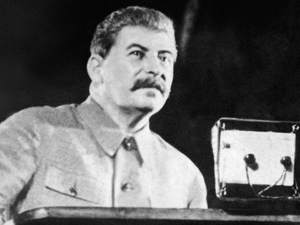Russian Town Dredges Up Stalin Statue, Old Divisions

The discovery of a Joseph Stalin statue at the bottom of a pond has divided a remote Russian town and dredged up a debate about the Soviet dictator's legacy.
Locals in Kusa, in the Ural mountains, noticed the larger-than-life statue last year when repair works brought down the water level.
Some want the statue to be returned to the spot where it stood decades ago. Others in the town of 18,000 people believe the relic of a regime that killed millions of its own citizens belongs in a museum.
The concrete statue is being restored after being badly damaged from lying in water.
It was after a social media user posted a photograph of the statue lying on the edge of the pond last summer that Communist activist Stanislav Stafeyev found it and took it home.
Together with other activists from the left-wing patriotic movement "Essence of Time", he is collecting funding to restore the work.
He told AFP that reinstating the statue would "advance understanding and awareness of that period of history."
Stafeyev said he has faced "tremendous pressure" from local authorities who have other plans for the statue.
The head of the Kusa municipal district, Yury Lysyakov, said authorities want people to see the statue in a museum "rather than in the street".
The museum will "describe the history of the man and the story of (the statue's) discovery and restoration", he said.
Because of the town's extreme climate, where temperatures vary between -40 and +40 degrees centigrade (-40 to 104 degrees Fahrenheit), the concrete structure would be further degraded if left outside, Lysyakov added.
Some residents cited nostalgia as a reason for wanting to see the statue re-erected.
"Perhaps it's related to my youth, when both Lenin and Stalin were the two leaders. I am for it being restored," Maria Tarynina, 69, told AFP.
But others said Stalin's repressions that killed millions should stop him from having a monument in the town.
"I am against it," said Irina Aksyonova, 39.
"He did a lot for the country, for the Soviet Union. But there's plenty of evidence that he acted badly towards his fellow citizens," she said.
Kusa already has a centrally located Lenin statue, like most Russian towns.
Statues of Stalin were dismantled throughout the USSR in 1956 after Soviet leader Nikita Khrushchev publicly denounced the dictator in a special address to the Communist Party.
A survey last year showed almost half of Russians aged 18 to 24 had never heard of Stalin's repressions.
In a separate poll this year, 70 percent of Russians said they approved of the dictator's role in history.
